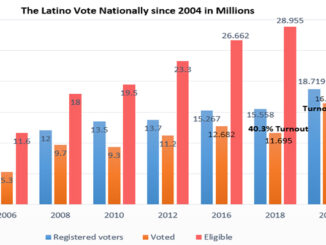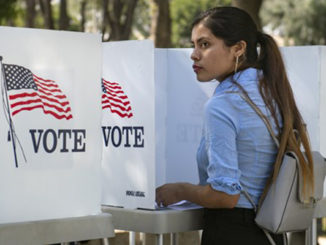by Henrik Temp
Hispanics have been the “sleeping giant” of American politics for decades. Each election season, we see more and more articles about how important this group of Americans is, and how their impact will be outsized and ever-growing. Yet for some reason, the “giant” never quite seems to wake up.
The simple reality is that Hispanics heavily under-represent themselves in politics when compared to other racial/ethnic groups. As the graphic below (from Resurgent Republic) shows, barely half of Hispanics eligible to vote in 2010 registered, and less than 1 in 3 actually cast a ballot. According to the Pew Research Center, Hispanics had a 49.9% voter turnout rate in 2008. For comparison, in that same year whites had a turnout rate of 66.1% and blacks had a turnout rate of 65.3%
 Hispanics’ low level of political participation extends beyond the ballot box. According to one study, 67% of whites reported performing at least one of a possible seven unconventional political acts (volunteering, donating money, etc.), whereas only 35% of Mexican Americans (the largest Hispanic subgroup) had.
Hispanics’ low level of political participation extends beyond the ballot box. According to one study, 67% of whites reported performing at least one of a possible seven unconventional political acts (volunteering, donating money, etc.), whereas only 35% of Mexican Americans (the largest Hispanic subgroup) had.
So what explains this lack of participation? Like everything to do with Hispanics, the answer is complex, but here are a few particularly important factors that span across the extremely diverse Hispanic community.
1. Lack of resources. Hispanics have lower incomes than whites. If you don’t have money, it can be difficult to engage in politics. For example, if you’re poor it’s more difficult to volunteer your time or money to a political campaign.
2. Lack of civic skills. Most Americans gain civic skills from their parents and their schools. Since 40% of Hispanics are foreign-born, a significant chunk of the population never had the chance to learn from either of these sources. Moreover, these foreign-born Hispanics will be unable to transmit civic skills to their children, making those children entirely reliant on an education system whose success is largely dependent on the socioeconomic status of the neighborhoods around them. Given Hispanics’ relative poverty, this means they are likely to attend lower-quality schools and thus receive less civic training.
3. Lack of motivation. Psychological engagement in politics is a necessary precursor to action, and it would seem that Hispanics have not, as of yet, become engaged in this way. According to Marisa A. Abrajano and R. Michael Alvarez, authors of New Faces, New Voices: The Hispanic Electorate in America, factual questions about politics posed to Hispanics show that “… consistently at least one-third of the respondents did not know the answer, and even when they ventured an answer, another 15 to 25 percent provided the incorrect response.” One third of Hispanics say they are not interested in politics, 25% say they almost never or very rarely watch tv news, and 45% almost never read a newspaper. A further 45% rely on Spanish-language news, meaning that they are not exposed to mainstream news sources.
4. Lack of institutions. Local and community organizations are effective motivators for political action, but such opportunities are few and far between among Hispanics, perhaps due to their socioeconomic status or the relatively large number of Hispanics who are new immigrants.
As mentioned above, these factors alone cannot entirely explain the participation gap between Hispanics and others. But they go a long way towards doing so. And according to the Pew Research Center, which recently completed a survey of the Millennial generation (18-24 year olds), it appears that the trend of Hispanic non-participation is likely to continue, as the chart below shows.
 The good news for Hispanics: Although their registration rate is still far below that of other ethnicities, they make up an increasingly large share of the population. According to Pew, they account for 21% of the millennial generation compared to 16% of the overall population. But unless their political participation rate rises, these gains won’t be reflected in national vote share and the Hispanic “sleeping giant” will slumber on.
The good news for Hispanics: Although their registration rate is still far below that of other ethnicities, they make up an increasingly large share of the population. According to Pew, they account for 21% of the millennial generation compared to 16% of the overall population. But unless their political participation rate rises, these gains won’t be reflected in national vote share and the Hispanic “sleeping giant” will slumber on.
This article was originally posted on American Enterprise Institute blog.



